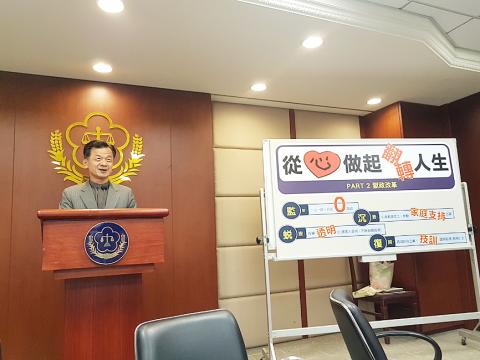The Ministry of Justice yesterday said that it was considering changes to prison policies, especially those regarding inmates’ families, to better rehabilitate prisoners and facilitate their reintegration into society after their release or parole.
The possible reforms include changes to prison facilities, making the parole process more transparent, introducing familial support, increasing the number of rehabilitation volunteers and helping inmates gain skill certificates, Minister of Justice Chiu Tai-san (邱太三).
Agency of Corrections Director Huang Chun-tang (黃俊棠) said overcrowding in prisons would be addressed by expansion projects for Taipei Prison, Taoyuan Prison, Second Yunlin Prison and Bade Prison in Taoyuan.

Photo: Chien Lee-chung, Taipei Times
The expansions are to accommodate a total of 4,755 prisoners in 2.31m2 cells with individual beds, he said.
Taipei Prison has 51 cellblocks, each about 19m2 to 26m2, meaning that with 16 inmates per block, each prisoner has only 1.65m2 of space, Huang said.
The expansion projects aim to eliminate overcrowding in prisons for at least four years, Chiu said.
More volunteers would be sought to carry out and improve the efficiency of individual and group rehabilitation efforts, the Ministry of Justice said.
In an effort to maintain familial relations — a key component to aid the reintegration of inmates into society — the ministry is to launch a project in which prisoners record stories for their children aged six or younger, it said.
The recordings would be made available for inmates’ family members and social welfare groups to help children cope with their fathers not being present, the ministry said, adding that the program would later be expanded to female inmates.
A number of academics and experts have been consulted in the drafting of new parole approval criteria, Chiu said.
The severity of the crime, the risk of an inmate repeating the offense and their attitude and performance during imprisonment are to be factors taken into consideration when parole applications are reviewed, he said.
The ministry said it is considering turning the current review method — in which victims and general members of the public are asked to review parole applications — into an alternative process, in which victims and social representatives would be asked to weigh in on applications via telephone or video conference.
The ministry is to allocate NT$70 million (US$2.3 million) annually to the corrections agency to have companies and organizations, such as Formosa Plastics Group (台塑集團) or Rotary International, offer courses at the prison or at alternative locations, it said.
The courses would cover more than 26 specialties, including stacker operation, baking, carpentry, pottery, electrical wiring and digital drawing, to teach inmates skills they could use to find employment upon their release or parole, the ministry said.
Correctional facilities must not only render just punishment to those who have broken the law, but also proactively re-educate them and ensure their smooth reintegration into society, Chiu said.

The combined effect of the monsoon, the outer rim of Typhoon Fengshen and a low-pressure system is expected to bring significant rainfall this week to various parts of the nation, the Central Weather Administration (CWA) said. The heaviest rain is expected to occur today and tomorrow, with torrential rain expected in Keelung’s north coast, Yilan and the mountainous regions of Taipei and New Taipei City, the CWA said. Rivers could rise rapidly, and residents should stay away from riverbanks and avoid going to the mountains or engaging in water activities, it said. Scattered showers are expected today in central and

People can preregister to receive their NT$10,000 (US$325) cash distributed from the central government on Nov. 5 after President William Lai (賴清德) yesterday signed the Special Budget for Strengthening Economic, Social and National Security Resilience, the Executive Yuan told a news conference last night. The special budget, passed by the Legislative Yuan on Friday last week with a cash handout budget of NT$236 billion, was officially submitted to the Executive Yuan and the Presidential Office yesterday afternoon. People can register through the official Web site at https://10000.gov.tw to have the funds deposited into their bank accounts, withdraw the funds at automated teller

COOPERATION: Taiwan is aligning closely with US strategic objectives on various matters, including China’s rare earths restrictions, the Ministry of Foreign Affairs said Taiwan could deal with China’s tightened export controls on rare earth metals by turning to “urban mining,” a researcher said yesterday. Rare earth metals, which are used in semiconductors and other electronic components, could be recovered from industrial or electronic waste to reduce reliance on imports, National Cheng Kung University Department of Resources Engineering professor Lee Cheng-han (李政翰) said. Despite their name, rare earth elements are not actually rare — their abundance in the Earth’s crust is relatively high, but they are dispersed, making extraction and refining energy-intensive and environmentally damaging, he said, adding that many countries have opted to

PEACE AND STABILITY: Maintaining the cross-strait ‘status quo’ has long been the government’s position, the Ministry of Foreign Affairs said Taiwan is committed to maintaining the cross-strait “status quo” and seeks no escalation of tensions, the Ministry of Foreign Affairs (MOFA) said yesterday, rebutting a Time magazine opinion piece that described President William Lai (賴清德) as a “reckless leader.” The article, titled “The US Must Beware of Taiwan’s Reckless Leader,” was written by Lyle Goldstein, director of the Asia Program at the Washington-based Defense Priorities think tank. Goldstein wrote that Taiwan is “the world’s most dangerous flashpoint” amid ongoing conflicts in the Middle East and Russia’s invasion of Ukraine. He said that the situation in the Taiwan Strait has become less stable